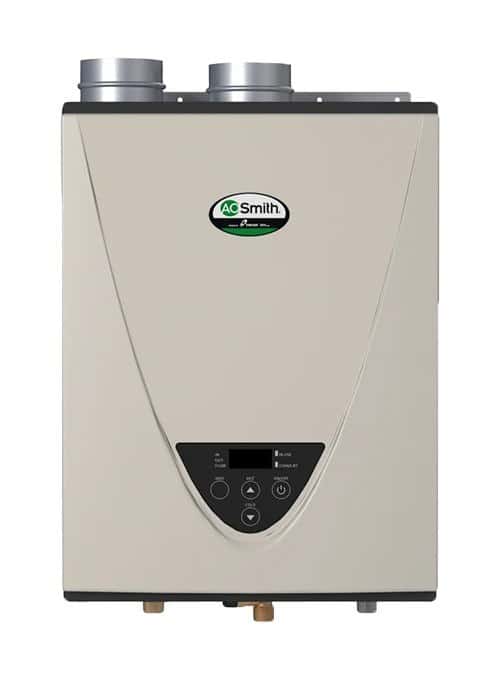Updated August 2023
Tankless water heaters heat your water supply only when you need hot water. With a traditional water heater, hot water is stored in a tank. Your heater is constantly heating the water to keep it at a certain temperature until you need it.
Their on-demand nature makes tankless water heaters a great addition to many homes. They can be a cost-effective option if you wish to replace an outdated water heater. However, tankless water heaters are not right for everyone.
How Do Tankless Water Heaters Work?
Tankless water heaters function in a simple way. You turn on the hot water, which causes cold water to travel from your plumbing network into the heating unit. A gas or electric element is activated to heat the water. Finally, hot water begins to flow out of your faucet.
With a tankless water heater, you don’t need a storage tank to first fill up with hot water. However, there is a limit on the flow rate of water. That means that you can only turn up your water faucet or shower so much and still have a constant flow of hot water.
With most tankless water heaters, you can produce a maximum of 5 gallons of hot water per minute. If you need a lot more hot water per minute, you may consider a traditional water heater instead.
Gas tankless water heaters have a slightly higher flow rate than their electric counterparts. Still, a gas water heater will not be able to supply a large amount of hot water simultaneously to multiple locations. For example, your spouse may be taking a shower and you are doing laundry. This demand for hot water from two sources may push your tankless water heater to the limit.
A common solution is to install multiple tankless water heaters that either work simultaneously or in parallel. These will provide water on-demand for specific appliances. For example, your dishwasher and your washing machine are going to demand a lot of hot water. You can install a tankless unit that is dedicated to your washing machine and another one that is dedicated to the dishwasher.
Gas Versus Electric Tankless Water Heater
If you are going to purchase a tankless water heater, you have to choose between electric or gas. When it comes to operation, the only difference is whether the water travels through a gas burner for a gas tankless heater or through an electric element for an electric tankless water heater.
Another factor to consider with electric heaters is that they can be up to 99% energy efficient. The installation process is pretty straightforward. They are relatively cheap to install and take up little space.
Gas heaters are not as efficient as their electric counterparts. However, they are a lot more powerful. If you have a large family or if you have a high flow rate, a gas alternative may work better for you. If your home does not have the wiring for electric water heating, gas is also a good option. Gas heaters are more expensive upfront. In the long run, they offer several benefits.
How Ground Temperature and Flow Rate Affect Tankless Water Heater Function
When choosing a tankless water heater, you should consider the groundwater temperature. If you live in states like Minnesota, Wisconsin, or Michigan, your average groundwater temperature will be between 35 and 45 degrees. Conversely, if you live in states like Texas or Florida, your average groundwater temperature is likely between 65 and 70 degrees.
Once you know your groundwater temperature, you need to calculate the difference between the incoming water temperature and your desired output water temperature. For most residential uses, you want your water to be heated to between 100 and 115 degrees.
For example, if you live in Minnesota, where the average groundwater temperature is around 40 degrees, you will need a unit that is able to produce a 60- to 75-degree increase in temperature while allowing for a sufficient flow rate.
Another factor to consider is the flow rate for the appliances or fixtures that you are using. For example, your bathroom faucet will have a flow rate of between 0.5 and 1.5 gallons per minute. On the high end, washing machines demand a flow rate of between 1.5 and 3 gallons per minute.
To know the average flow rate that you will need from a tankless water heater, you will need to add up the appliances or fixtures you expect to use simultaneously. For example, if you plan on using your shower, which has a 2-gallon per minute flow rate, and your washing machine, which has a 3-gallon per minute flow rate, you will need your tankless heater to have a flow rate of at least 5 gallons per minute.
Advantages of Tankless Heaters
Tankless water heaters produce instant hot water, they save space, and they have a lower monthly cost. On the downside, they do cost more initially to purchase, they have a higher installation cost, and they may require additional equipment in order to function.
When looking at cost, you have to factor in the up-front price of a tankless water heater. They can be between 20% and 30% more than a traditional water heater. Additionally, it is more expensive to install and maintain a tankless unit. However, if you look at the unit over the length of its life, you see that it has a longer lifespan, it requires less energy, and it is cheaper to operate.
It is good to know that the lifespan of a tankless water heater is around 20 years. Traditional water heaters last between 10 and 15 years. Tankless water heaters have several components that are easy to replace. This makes it easier for technicians to do maintenance on your water heater.
Installation and maintenance will be more expensive with a tankless water heater. But the better you maintain it, the longer it will last. Some of the factors that will influence how long it lasts include the climate, the fuel type used, and the local building codes. It is recommended that you have professionals, like the technicians we have at Environmental Heating & Air Solutions, help you with the installation process.
Are You Ready to Install a Tankless Water Heater?
If the answer is yes, Environmental Heating & Air Solutions has the team with the skill and experience needed to help you find the right tankless water heater and ensure that it is properly installed. We are an EGIA member. We have BPI and NATE certifications. Our HVAC service experts provide quality work that exceeds expectations.
The services that we offer include air conditioning installation and repair, heating systems installation and repair, ductwork, duct cleaning, thermostats, air scrubbers, and a whole lot more. Whether you need regular maintenance, an inspection, or to completely renovate your HVAC system, we are here when you need us. We are proud to offer free estimates and provide 24/7 emergency service to Roseville, CA, and the surrounding communities. Schedule a consultation with our team today.

